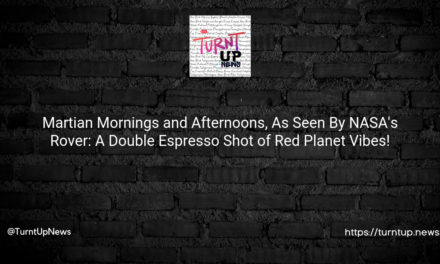🎶🌌When the Universe Sings: Gravitational Waves Resound Across Cosmos! 🌠🎵
TL;DR: 🚀 Buckle up, space nerds! After literal decades of brain-busting research, scientists have finally picked up the ‘call’ of low-frequency gravitational waves – think the universe’s cosmic radio waves! These mind-boggling ripples are the celestial answer to when massive objects have a collision course party in space. The fun part? The whole universe gets stretched and squeezed! But, the real question is: what does it all mean for us? 🤔💫
🌌 The universe has been hiding a cosmic symphony, a concert of gravitational waves that stretches and contracts the fabric of existence itself. Scientists have been on the hunt for these super-low-frequency ‘songs’ for decades. But only now, they’re able to play back the echoes of massive objects, like black holes, doing the cosmic cha-cha in space. Can you even imagine the cha-cha on a scale that large? 🕺💃
It’s been a long time coming, folks. Low-frequency gravitational waves were first on Einstein’s radar, predicting their existence as a ripple effect whenever weighty objects groove through the space-time fabric. It’s like dropping a bowling ball on a trampoline, but instead of a bouncy fun time, we get gravity waves! 🎳🌊
Fast forward to 2015, the LIGO experiment managed to record these waves for the first time, confirming good ol’ Einstein’s prediction. However, that method only caught the ‘fast’ waves, those high-frequency chirps caused by smaller black holes and dead stars bumping into each other. The celestial equivalent of playing ‘tag’ in space, if you will! 😄🌟
The latest research, though, was after something different. The low-frequency waves, the slow, deep bass of the cosmic opera. These ripples are born from the dance of supermassive black holes, billions of times larger than our sun, circling each other like celestial tango dancers. These ‘big guys’ create waves that can take years or even decades to peak and trough. Can you imagine waiting for a beat to drop for that long? 🎧🎶
Detecting these waves was no small feat – they had to create a detector the size of a galaxy! Talk about ‘go big or go home’, right? The results of the NANOGrav research group’s 15-year data collection were released, showing the elusive slow ripples in our universe’s fabric. This discovery was like eavesdropping on a cosmic party, hearing the chatter of the universe, but not being able to make out any specific conversations. 🥳🌍
The detection methods may not be able to point out where exactly these low-frequency waves are coming from, but they do reveal a cosmic hum, a background noise louder than expected. This might hint at more, or larger, black hole shindigs happening out there, or it might indicate other sources of gravitational waves we don’t even know about yet.
Now, isn’t that thought-provoking? As we dig deeper, we may unravel the secrets of ‘cosmic archaeology’, tracking the history of black holes and galactic mergers. So, the next time you look up at the night sky, remember you’re looking at a cosmic party in full swing! And with these recent revelations, we’ve just been handed an invitation. So, how will we RSVP? 🔭💌
But here’s the question we’ve got to ask: With the universe essentially playing a cosmic concert all around us, what else might be





